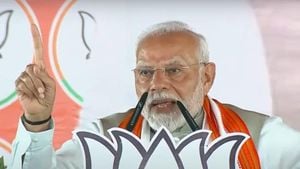America's 2024 presidential election illuminated deep divides along gender lines, showcasing the complex and often troubling dynamics of misogyny both observed and perpetuated. Donald Trump, the embattled former president, held the Republican nomination, taking center stage as the campaign generated considerable traction with his controversial rhetoric and allegations of sexual misconduct. On the opposite end, the Democratic ticket featured Kamala Harris, the Vice President, who sought to become the nation's first female president, paired with Minnesota Governor Tim Walz, recognized for his progressive takes on sensitive subjects.
The electoral environment resembled more than just traditional political maneuvers; it morphed, for many, directly or indirectly, as a battle of the sexes. Harris’s candidacy sought to galvanize women voters, focusing on issues surrounding reproductive rights, which Republicans aimed to undermine. Yet, the final tally painted a different picture; many women opted for Trump, leaving the Democrats struggling to comprehend how such choices could reflect broader societal sentiments.
Interestingly, Trump's steely ability to pull female voters away from their democratic counterparts stood out this election season. Exit polls indicated he garnered 45% of the female vote, inching closer to Harris’s 53%, which is seen as remarkable considering he lost among women by 15 percentage points just four years prior. This swing was especially notable among younger women, many of whom seem drawn to his brash persona. Yet this phenomenon also raised eyebrows about the societal undercurrents complicity with misogynistic leadership.
Social media's role during and after the election couldn’t be understated. An alarming spike in misogynistic commentary emerged, fueled partly by far-right influencers like Nick Fuentes and the pervasive ‘4B’ movement. Young women increasingly rejected relationships with men who exhibited misogynistic tendencies, marking their protest against patriarchy through this newly adopted social mantra. Fueled by frustrations around issues of sexual autonomy and respect, this movement reflected the anger and indifference many faced during the campaign.
Encouragingly, such trends opened conversations surrounding the objectification of women. Ideas surrounding relationships and sex were increasingly complicated. The 4B movement designated romantic engagements as potentially oppressive, and many women articulated their discomfort with disproportionately favoring men, especially those reveling in the echo chambers of toxic masculinity.
The churning atmosphere marked by hatred and rejection of women's autonomy wasn't limited to social settings. Vile retorts like the phrase "Your body, my choice" served as stark reminders of the deep-seated misogyny suffered by women, particularly after Trump's ascendancy. The phrase, coined by Fuentes, doubled as both mockery of pro-choice sentiments and as deliverance of threats against women. Its usage surged after the election, adopted gleefully by many Trump supporters as they attempted to belittle women and their fight for reproductive rights.
Previous elections, which had seen broader female solidarity, now lay bare inconsistencies among women’s views on autonomy and governance. Within conservative circles, women rallied behind Trump, advocating for traditional values and expressing skepticism toward Harris’s progressive platform. This schism elucidated how not all women view the fight for their rights through the same lens. Many conservative women equated Trump’s administration with liberty from modern feminist ideals perceived as divisive.
The juxtaposition between feminism and conservatism has historically been fraught. Women supporting Trump often felt their voices were drowned out by mainstream narratives labeling them self-haters—an uncomfortable position making it difficult to strike common ground. The battle for identity and values within womanhood clashed at unprecedented levels as decidedly so-called traditional roles began to resurface.
Every election not only redefines political boundaries but also fosters conversations probing societal norms. Trump’s campaign strategically oriented around masculinity, touting aggressive and abrasive disputes against traditional female politicking. His supporters cherished perceptions of authority and hierarchy, putting emphasis on roles where men had dominion, mostly diminishing women’s participation to mere accessories or tokens of loyalty.
This election saw slogans emerge meant to ridicule movements advocating for women’s rights, leading many women to realize their autonomy was increasingly questioned. Anecdotes of young boys echoing derisive slogans at school turned the atmosphere hostile, forcing both educators and students to confront the chaos wrought by political emotions.
Critically, many observers believe the diminishment of women’s rights is bound with Trump's political identity, showcasing the movement’s penchant for controlling narratives around female autonomy. The fixation on conservative motherhood seemed at odds with notions of freedom many pursued with Harris’s candidacy.
The reflection of women’s divisions suggests the need to recognize the complexity within feminism itself. Throughout history, women have been detractors from one another’s rights, sowing doubts about the myth of universal sisterhood. Contrary to the romanticized notion, it is evident there exists competing interests among various groups of women, often mired deeply within social and racial constructs.
This schism is continued proof women do not form unanimous blocs; rather, their varied experiences lead to differing opinions on success and roles within society. While some hailed Trump’s presidency as liberation from perceived feminist constrictions, others remained perplexed by their democratic counterparts’ choices.
With this election exposing deep rifts, it invites us to navigate forward with acknowledgment of varied experiences and collective processes which shape political views. Women’s votes indicated significantly divergent expectations of governing; such disillusionment signals unresolved societal issues awaiting deliberation—ultimately showcasing the reality of women's position not purely as allies but as contending forces.
Standout publicly figures resonate within political space, and their success often draws scrutiny. While more conservative women lauded Trump’s first female chief of staff, the backlash over disbelief led to questioning whether his actions truly reflected equality. It raises questions: can tradition align with progress without leaving certain demographics behind? The pursuit of justice and equality continues across landscapes needing more authentic conversations about agency and rights.
The broad spectrum of voter behavior serves as both inspiration and caution; the outcome of the 2024 elections has reshaped how society perceives gender identity and rights, spotlighting both divisions among women voters and highlighting their continued struggle against deeply entrenched misogyny. Amidst the chaos, there lies opportunity for dialogue and change at the core of political identity.



